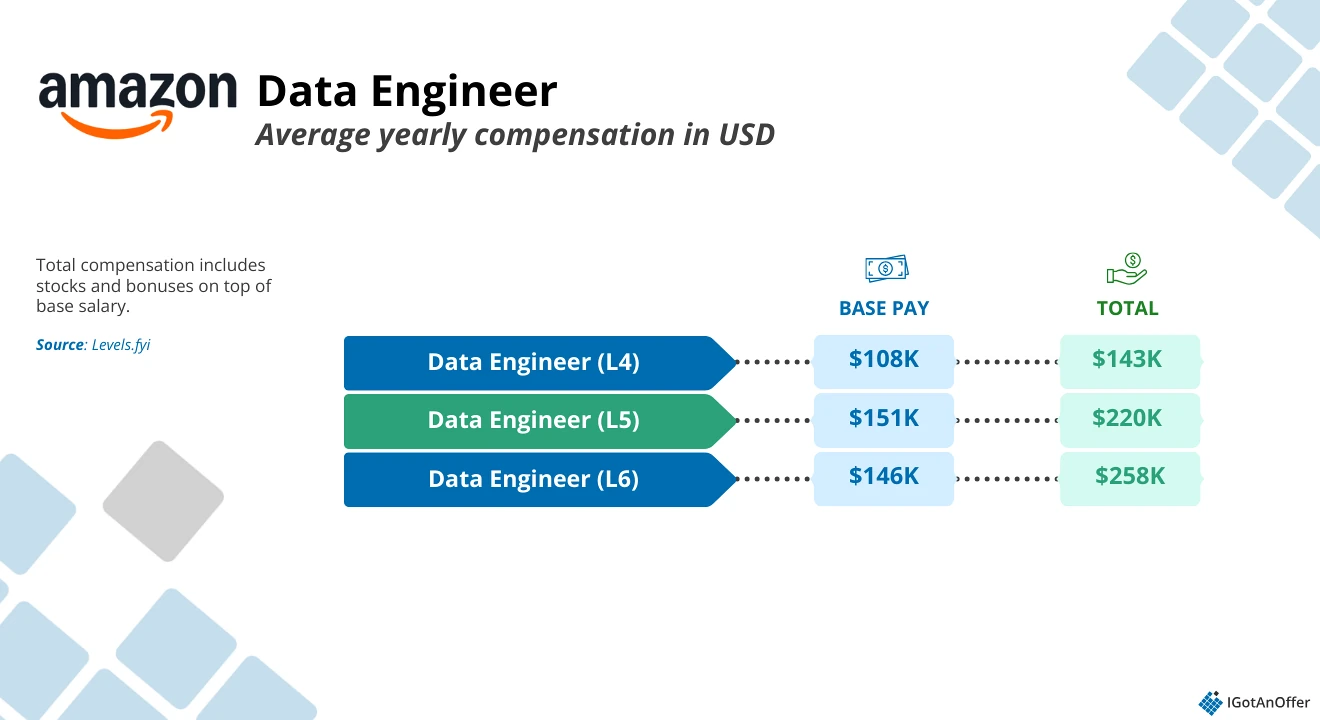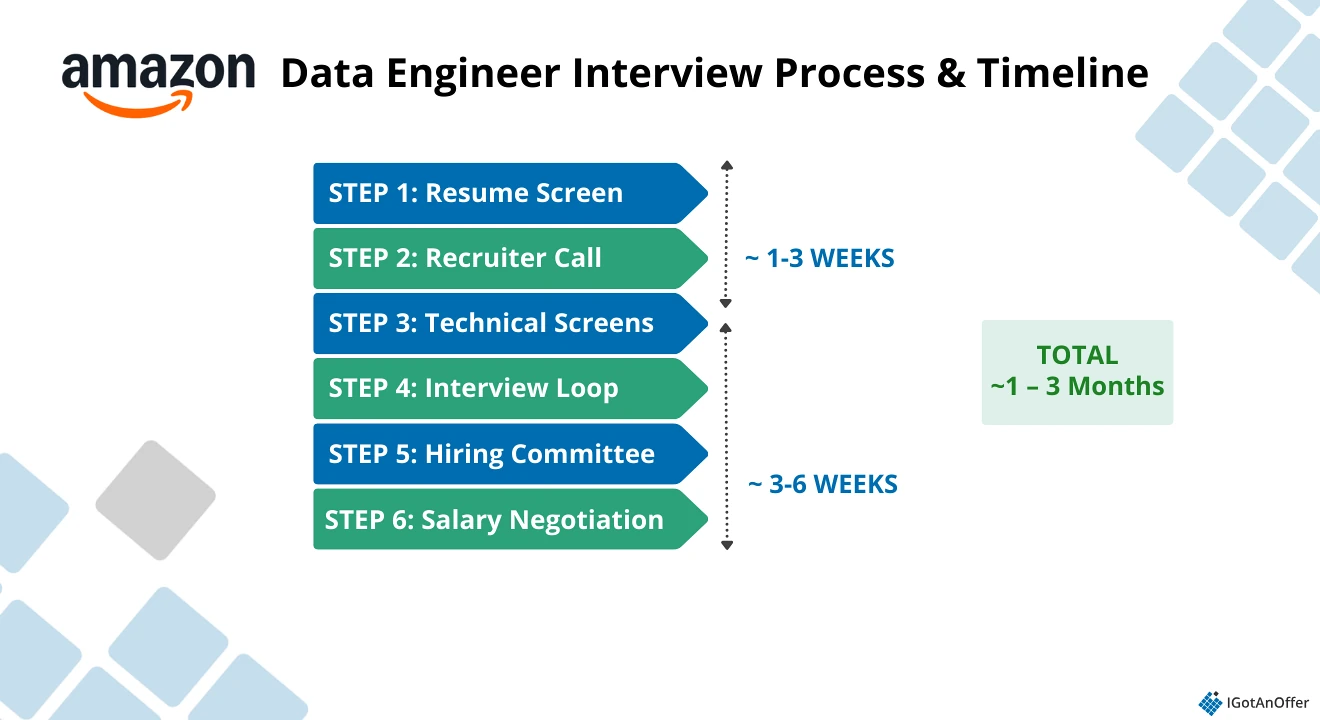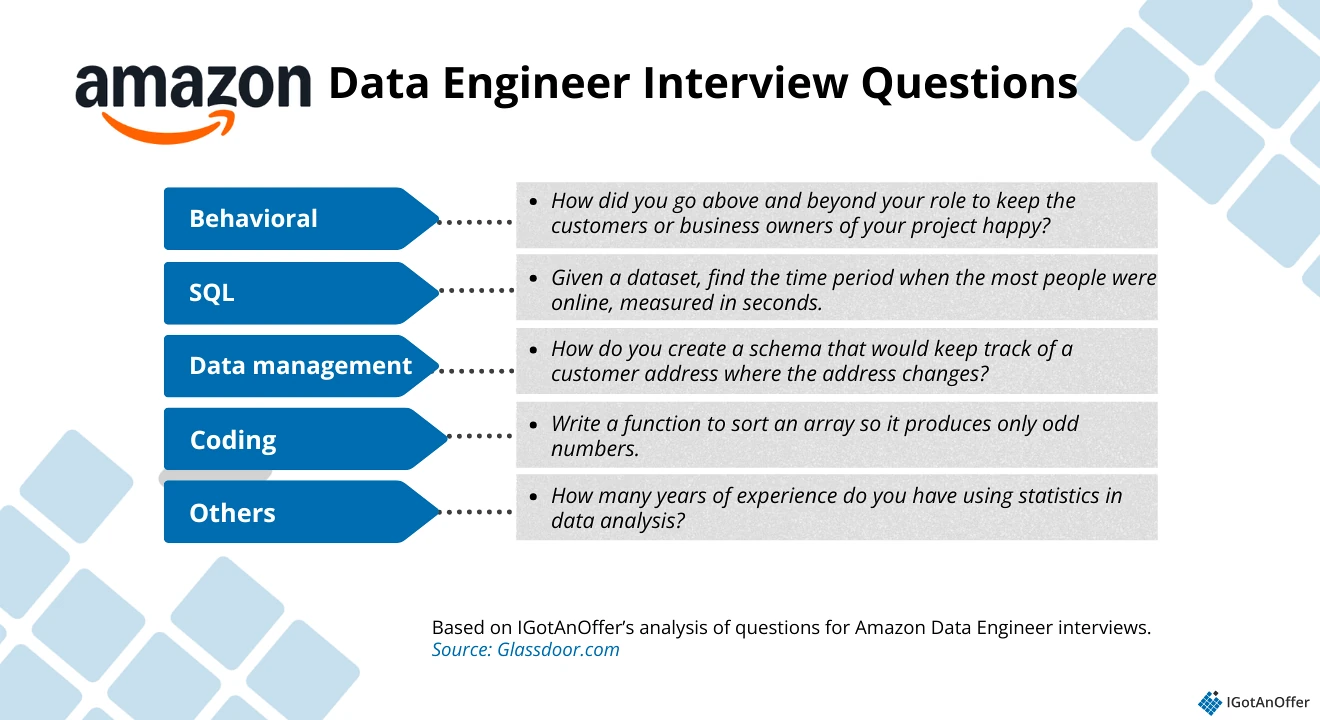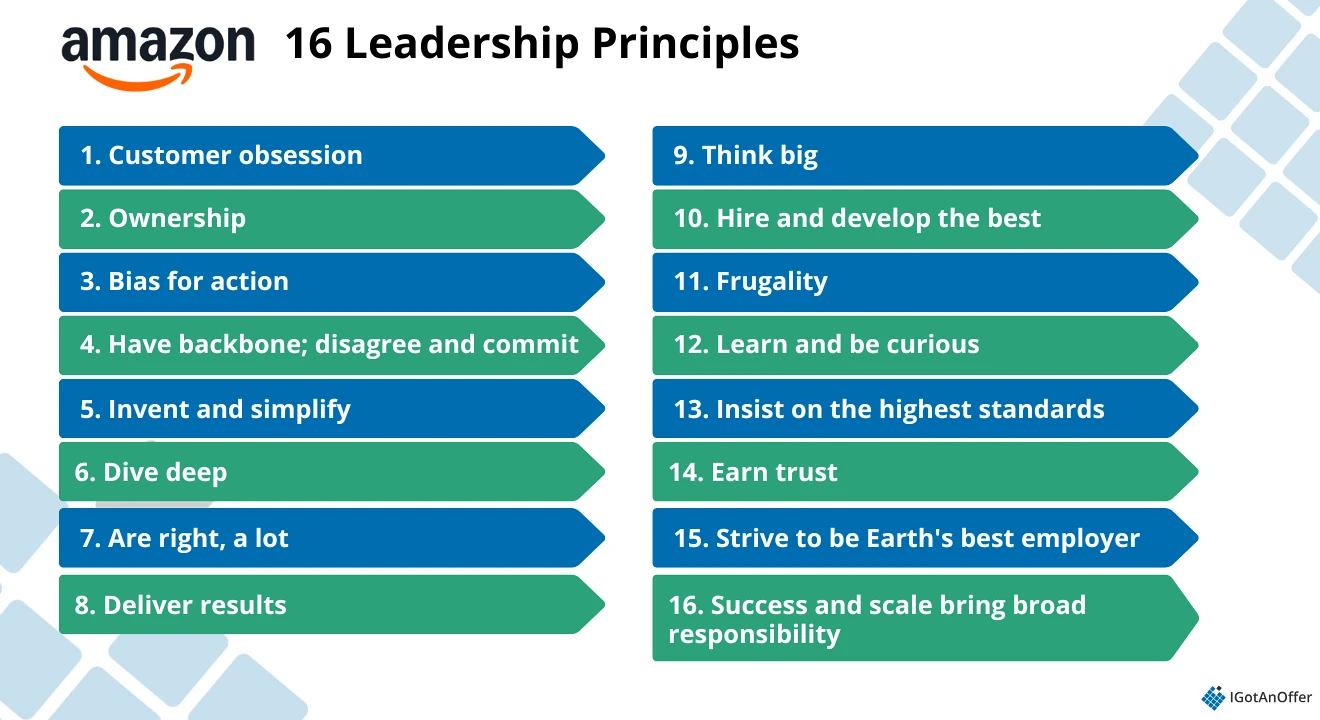Amazon data engineer interviews are difficult, with a range of complex questions. Even if you make it all the way to the interview loop, it’s likely you’ve only got about 20% chance of receiving an offer.
The good news is that the right preparation can help you beat that statistic. To maximize your chances of success, we've put together the ultimate guide, complete with 50+ example questions and insider advice from our expert Amazon coaches Jitesh, Bilwasiva, and Dessy.
Here’s an overview of what we’ll cover:
Let’s get started.
Click here to practice 1-on-1 with a data engineer ex-interviewer
1. Amazon Data Engineer Role and Salary↑
Before we cover your Amazon data engineer interviews, let’s look at the role first.
1.1 What does an Amazon Data Engineer do?
As a data engineer at Amazon, you’d be responsible for building and maintaining the framework that facilitates data gathering, retention, and examination for their specific team or business unit. They design large-scale data solutions with the goal of making the company’s complex data accessible in the most efficient way possible, so that the rest of the organization can use it to evaluate and improve their products, features, and services.
As an Amazon/AWS data engineer, you could join various teams including Consumer Technology, Human Resources Technology, Operations Technology, AWS Databases, Analytics and AI/ML Products and Services, Infrastructure Operations, etc. Each business unit will have diverse and high volume of data that their DEs need to deal with on a regular basis.
Aside from working with huge datasets and building scalable data solutions, Amazon DEs are expected to work with cross-functional teams and stakeholders.
What skills are required for the Amazon Data Engineer role?
The minimum requirement you’d need to qualify for an Amazon/AWS data engineer role is at least 3+ years of data engineering experience, experience with data modeling, warehousing and building ETL pipelines, and SQL experience. You’ll find that some openings require having a bachelor’s degree in any technical or quantitative field such as computer science, engineering, analytics, mathematics, statistics, IT or equivalent. If you have a master’s degree, even better, but it’s not required.
Experience with AWS technologies like Redshift, S3, AWS Glue, EMR, Kinesis, FireHose, Lambda, and IAM roles and permissions as well as with non-relational databases/data stores, will make you stand out as a DE candidate at Amazon/AWS.
As for programming language, you’ll need to be proficient in at least one, like Python, Ruby, Java, or similar.
Different job postings will have even more unique requirements, so it’s important to read through each to find a position that matches your background and interests.
1.2 How much does an Amazon Data Engineer make?
A great salary is likely one of the reasons you're interested in working at Amazon, so let's take a look at how much you could potentially make as an Amazon DE.
Based on Glassdoor data, the median total pay for an Amazon data engineer is $220k, 40% higher than the median total pay for data engineers in the US.
Location is an important factor when it comes to salary. To compare, based on Glassdoor data:
- Amazon India data engineer: est. average total pay $19.6k
- Amazon US data engineer: est. average total pay $220k
Below you can see the average salary and compensation of the different data engineer levels at Amazon US, as of early 2026, based on Levels.fyi.

While we presume that you already know which level you are applying for, it’s still good to double-check with your recruiter. They should be able to advise you on which level you’re being evaluated.
Ultimately, how you do in your interviews will help determine what you’ll be offered. That’s why hiring one of our ex-Amazon interview coaches can provide such a significant return on investment.
And remember, compensation packages are always negotiable, even at Amazon. So, if you do get an offer, don’t be afraid to ask for more. If you need help negotiating, read our Amazon salary negotiation guide or consider booking one of our salary negotiation coaches to get expert advice.
2. Amazon Data Engineer Interview Process and Timeline↑

The Amazon interview process for the data engineer role usually takes around one to three months. Here are the steps you can expect to take during your application:
- Resume screen
- Technical phone screen (1-2 calls, 75 min each)
- Interview loop (5 interviews, 55 min each)
2.1 What steps to expect
2.1.1 Resume screen
First, recruiters will look at your resume and assess if your experience matches the open position. This is the most competitive step in the process, as millions of candidates do not make it past this stage.
If you've yet to write your resume or need help polishing your current one, check out our Amazon resume guide. There you'll find real examples of resumes that passed the Amazon screening, as well as some helpful tips from experts.
If you’re looking for expert feedback on your resume, you can get input from our team of ex-FAANG/MAANG recruiters, who will cover what achievements to focus on (or ignore), how to finetune your bullet points, and more.
Suppose you do have a connection to someone at Amazon. In that case, it can be really helpful to get an employee referral, as it may increase your chances of getting into the interview process.
2.1.2 Technical phone screen
If you pass the resume screen, a recruiter will reach out to you to schedule you for your technical phone screen. You can expect to have 1 to 2 phone screens, each lasting up to 75 minutes.
Based on this candidate report, your first phone screen will involve questions to assess your basic SQL knowledge and your data engineering experience. The second will lean more on the advanced technical side.
According to Amazon interview coach Jitesh, you will be tested on the following topics during your phone screen:
- General application of complex SQL and basic scripting (R/Python)
- Data visualization knowledge (e.g. related projects, building end-to-end dashboards, working on metrics, experience working with various visualization tools such as Tableau/Power BI)
- Analytical problem-solving or how you approach a problem (in particular statistics and basic scripting)
- Working with cross-functional teams, like stakeholder engagement
- Ability to handle ambiguous situations/projects
- Database-related knowledge (e.g. relational and non-relational databases, OLAP, etc.)
During your SQL coding assessment, you’ll be required to share your screen.
You’ll also be assessed on your alignment with Amazon’s Leadership Principles during your phone screens. DE interview coach Jitesh says these are equally as important as the SQL technical questions, so it’s best to dive deep into LPs even as early as your phone screens. We’ll cover these in depth in the behavioral interview questions below.
2.1.3 Interview loop
If you pass your technical phone screens, you’ll then be invited to an interview loop. This may happen virtually or in one of the Amazon offices. Your recruiter will let you know beforehand which format to prepare for.
The interview loop will consist of 5 back-to-back interviews, each lasting up to 55 minutes. Expect a mix of people from the team you’re applying to join, including data engineers, software engineers, hiring managers, and a senior executive called the Bar Raiser.
Bar Raisers are not associated with the team you’re applying for. Instead, they focus on overall candidate quality rather than specific team needs. They get special training to make sure Amazon’s hiring standards stay high, so they are a big barrier between you and the job offer.
Expect a higher emphasis on behavioral questions at Amazon relative to other tech companies. Each interviewer is usually assigned 2 or 3 of Amazon’s 16 Leadership Principles to focus on during your interview. We’ll dive deeper into the questions to expect in Amazon data engineer interviews in section 3.
2.2 What the Amazon interview evaluation form looks like
At the end of each interview, your interviewer will grade your performance using a standardized feedback form that summarizes the attributes Amazon looks for in a candidate. The form is constantly evolving, but we have listed some of its main components below.
A) Notes
The interviewer will file the notes they took during the interview. This usually includes the questions they asked, a summary of your answers, and any additional impressions they had (e.g. communicated ABC well, weak knowledge of XYZ, etc.).
B) Technical competencies
Your interviewer will then grade you on technical competencies. They will be trying to determine whether you are "raising the bar" or not for each competency they have tested.
In other words, you'll need to convince them that you are at least as good as or better than the average current Amazon DE at the level you're applying for.
The exact technical competencies you'll be evaluated against vary by role. But here are some common ones for data engineering roles:
- Analytical problem-solving
- Communication and cross-functional collaboration skills
- Advanced knowledge of SQL, data modeling and warehousing, ETL development, etc.
- Data visualization skills
C) Leadership Principles
Your interviewer will also grade you on Amazon's 16 Leadership Principles and assess whether you're "raising the bar" for those too. As mentioned above each interviewer is given two or three Leadership Principles to grill you on. We’ll cover these in detail in section 3.
D) Overall recommendation
Finally, each interviewer will file an overall recommendation into the system. The different options are along the lines of: "Strong hire", "Hire", "No hire", and "Strong no hire".
2.3 What happens behind the scenes
Your recruiter is leading the process and taking you from one stage to the next. Here's what happens at each of the stages described above:
- After the technical phone screens, your recruiter decides to move you to the interview loop or not, depending on how well you've done
- After the interview loop, each interviewer files their notes into the internal system, grades you, and makes a hiring recommendation (i.e. "Strong hire", "Hire", "No hire", "Strong no hire")
- The "Debrief" brings all your interviewers together and is led by the Bar Raiser, who is usually the most experienced interviewer and is also not part of the hiring team. The Bar Raiser will try to guide the group toward a hiring decision. It's rare, but they can also veto hiring even if all other interviewers want to hire you.
- You get an offer. If everything goes well, the recruiter will then give you an offer, usually within a week of the onsite but it can sometimes take longer.
It's also important to note that recruiters and people who refer you have little influence on the overall process. They can help you get an interview, but that's about it.
3. Amazon Data Engineer Example Questions↑

Let’s get into the primary categories of questions you’ll encounter in the Amazon data engineer interview.
Here are the most common question categories based on the questions reported by Amazon DE candidates on Glassdoor.
- Behavioral interview questions
- SQL interview questions
- Data management interview questions
- Data modeling
- Data warehousing
- Data pipelines
- Coding interview questions
- Others: analytical problem-solving, data visualization
Do note that each Amazon business unit or team will have different technical requirements. Your recruiter should be able to advise you on which aspects to focus on.
In the sections below, we've put together a high-level overview of each type of question to help you prepare. We also have links to resources you can use once you’re ready to dive deep.
Additionally, we've compiled a selection of real Amazon data engineer interview questions, according to data from Glassdoor. Note that we’ve edited the language in some places to improve the clarity or grammar.
3.1 Behavioral interview questions
Amazon’s Leadership Principles tie into every step of the interview process, and interviewers will test your affinity with them through behavioral questions.

Even in the technical rounds, your interviewers are looking for you to live and breathe these 16 principles, so spend extra time studying them.
Below is a breakdown of each leadership principle. Under each principle, you’ll find sample questions generally asked at Amazon interviews. The ones reported by DE candidates on Glassdoor are in bold. We’ve also added additional insights from our expert coaches to help you prepare.
3.1.1 "Customer obsession" interview questions
Customer obsession — "Leaders start with the customer and work backwards. They work vigorously to earn and keep customer trust. Although leaders pay attention to competitors, they obsess over customers.”
Customer obsession is about empathy. Interviewers want to see that you understand the consequences that every decision has on customer experience. You need to know who the customer is and their underlying needs, not just the tasks they want done.
This is by far the most important leadership principle used at Amazon. Therefore, it is the most critical one to prepare for.
Example "customer obsession" questions asked by Amazon
- How did you go above and beyond your role to keep the customers or business owners of your project happy?
- Tell me about a time you had to deal with a difficult customer
- Tell me about a time you made something much simpler for customers.
- Which company has the best customer service and why?
- Tell me about a time you said no to a customer request and why.
According to Bilwasiva, Amazon interview coach, here are the best ways to answer ‘customer obsession’ questions:
- Provide examples of how you've prioritized customer needs in your previous roles, showcasing your commitment to understanding and addressing customer pain points.
- Discuss specific initiatives or projects where you've gone above and beyond to deliver exceptional customer experiences, highlighting the outcomes and impact.
3.1.2 "Ownership" interview questions
Ownership — "Leaders are owners. They think long term and don’t sacrifice long-term value for short-term results. They act on behalf of the entire company, beyond just their own team. They never say “that’s not my job.”
Interviewers at Amazon want to avoid hiring people who think, “That’s not my job!” When answering ownership questions, you’ll want to prove that you take initiative, can make tough decisions, and take responsibility for your mistakes.
Dessy, ex-Amazon interviewer advises preparing a situation that shows how you take ownership of a project even when you work cross-functionally, and how you go above and beyond to follow through and deliver.
Example "ownership" questions asked by Amazon
- What difference have you made in your current team apart from regular work?
- Tell me about a time you did something at work that wasn't your responsibility / in your job description
- Describe an instance where you had to make an important decision without approval from your boss.
- Tell me about a time you took ownership of a problem that was not the focus of your organization.
- When was the last time that you sacrificed a long-term value to complete a short-term task?
3.1.3 "Bias for action" interview questions
Bias for action — "Speed matters in business. Many decisions and actions are reversible and do not need extensive study. We value calculated risk-taking.”
Since Amazon likes to ship quickly, they also prefer to learn from doing (while also measuring results) vs. performing user research and making projections. They want to see that you can take calculated risks and move things forward.
Bilwasiva, Amazon interview coach advises preparing examples that “emphasize the importance of learning from failures and iterating on ideas to continuously improve and move forward.”
Example "bias for action" questions asked by Amazon
- Tell me about a time when you completed a task without informing your manager.
- Tell me about a time you had to change your approach because you were going to miss a deadline.
- Tell me about a time you had to make a decision with incomplete information. How did you make it and what was the outcome?
- Tell me about a time when you launched a feature with known risks.
- Tell me about a time you broke a complex problem into simple sub-parts.
- Describe a time you identified and implemented improvements to your work.
- Give an example of a time you went above and beyond a request that was asked of you.
3.1.4 "Have backbone; disagree and commit" interview questions
Have backbone; disagree and commit — "Leaders are obligated to respectfully challenge decisions when they disagree, even when doing so is uncomfortable or exhausting. Leaders have conviction and are tenacious. They do not compromise for the sake of social cohesion. Once a decision is determined, they commit wholly.”
Any group of smart leaders will disagree at some point. Amazon wants to see that you know when to challenge ideas and escalate problems to senior leadership. At the same time, they want to know you can sense the right time to move forward regardless of your disagreement.
Example "have backbone; disagree and commit" questions asked by Amazon
- Tell me about a time you were in a meeting and had a different opinion from everyone else in the room. What did you do and what was the outcome?
- Tell me about a time you had a conflict with a coworker or manager and how you approached it.
- Tell me about a time you disagreed with your team and convinced them to change their position.
- Tell me about a time you had a conflict with your team but decided to go ahead with their proposal.
- Tell me about a time your work was criticized.
3.1.5 "Invent and simplify" interview questions
Invent and simplify — "Leaders expect and require innovation and invention from their teams and always find ways to simplify. They are externally aware, look for new ideas from everywhere, and are not limited by “not invented here." Because we do new things, we accept that we may be misunderstood for long periods of time.”
Amazon relies on a culture of innovation. Answering invent and simplify questions is an opportunity to show your ability to create solutions when there is no obvious answer.
You’ll also want to show that you know how to execute big ideas as simply and cheaply as possible. “Think about examples where you've come up with innovative, alternative solutions instead of building a feature that required engineering resources,” Dessy, ex-Amazon interviewer says.
Example "invent and simplify" questions asked by Amazon
- Tell me about a time you suggested a new approach.
- What is the most innovative idea you've ever had?
- Tell me how you built a feature in an innovative way, give specific details.
3.1.6 "Dive deep" interview questions
Dive deep — "Leaders operate at all levels, stay connected to the details, audit frequently, and are skeptical when metrics and anecdote differ. No task is beneath them.”
When something isn’t working, DEs need to quickly find a solution. Interviewers want to see that you are excited to dive deep when problems arise.
Example "dive deep" questions asked by Amazon
- Tell me about a project in which you had to deep dive into analysis.
- Tell me about the most complex problem you have worked on.
- Describe an instance when you used a lot of data in a short period of time.
3.1.7 "Are right, a lot" interview questions
Are right, a lot — "Leaders are right a lot. They have strong judgment and good instincts. They seek diverse perspectives and work to disconfirm their beliefs.”
As a data engineer candidate, you’ll want to demonstrate skill in dealing with ambiguous situations and taking calculated risks. You also want to show that you're comfortable having your own opinions challenged before moving ahead.
Example "are right, a lot" questions asked by Amazon
- Tell me about a time you applied judgment to a decision when data was not available.
- Tell me how you deal with ambiguity.
- Describe a time you made a mistake.
- Tell me about a time you had very little information about a project but still had to move forward.
3.1.8 "Deliver results" interview questions
Deliver results — "Leaders focus on the key inputs for their business and deliver them with the right quality and in a timely fashion. Despite setbacks, they rise to the occasion and never settle.”
Amazon values action over perfection. When answering questions related to delivering results, you’ll want to indicate that you dislike slipped deadlines and failed goals.
Example "deliver results" questions asked by Amazon
- Tell me about the most challenging project you ever worked on.
- How do you prioritize in your current role?
- Give examples of what you have accomplished in the past, and relate them to what you can achieve in the future.
3.1.9 "Think big" interview questions
Think big — "Thinking small is a self-fulfilling prophecy. Leaders create and communicate a bold direction that inspires results. They think differently and look around corners for ways to serve customers.”
Amazon is huge and its DEs need to build data solutions on a significant scale to make a difference for the business. As a result, interviewers will want to see that you can develop and articulate a bold vision.
To demonstrate your ability to ‘think big’, Bilwasiva, Amazon interview coach says: “Share examples of how you've challenged the status quo, pursued innovative ideas, and inspired others to think beyond conventional boundaries.”
Example "think big" questions asked by Amazon
- Tell me about your most significant accomplishment. Why was it significant?
- Tell me about a time when you broke the status quo.
- Describe a time you proposed a non-intuitive solution to a problem and how you identified that it required a different way of thinking.
- Give a specific example where you drove adoption for your vision and explain how you knew it had been adopted by others.
3.1.10 "Hire and develop the best" interview questions
Hire and develop the best — "Leaders raise the performance bar with every hire and promotion. They recognize exceptional talent, and willingly move them throughout the organization. Leaders develop leaders and take seriously their role in coaching others. We work on behalf of our people to invent mechanisms for development like Career Choice.”
As mentioned above, Amazon wants new hires to “raise the bar.” Interviewers will want to see that you are not afraid of working with and hiring people smarter than you.
You should also show you enjoy coaching younger colleagues and know how to get the most out of top performers. You’ll notice the examples listed here are general interview questions, but they provide a perfect opportunity for you to address this principle.
This leadership principle is typically discussed in interviews for very senior engineering positions that involve people management or building a team.
Example "hire and develop the best" questions asked by Amazon
- Describe a time you stepped in to help a struggling teammate
- Tell me about a time you helped boost your team morale
- Tell me about a time you hired or worked with people smarter than you are
- Why do you want to work at Amazon?
3.1.11 "Frugality" interview questions
Frugality — "Accomplish more with less. Constraints breed resourcefulness, self-sufficiency, and invention. There are no extra points for growing headcount, budget size, or fixed expense.”
At every touchpoint, Amazon tries to provide customers with as much value for as little cost as possible. Interviewers will be looking for how you can support this idea while maintaining a constant drive for innovation.
Example "frugality" questions asked by Amazon
- Describe the last time you figured out a way to keep an approach simple or to save on expenses.
- Tell me about a time you successfully delivered a project without a budget or resources.
3.1.12 "Learn and be curious" interview questions
Learn and be curious — "Leaders are never done learning and always seek to improve themselves. They are curious about new possibilities and act to explore them.”
Amazon demands constant improvement in every part of their business. You’ll want to show that you are interested in learning new things and exploring new ideas.
Some examples listed here are general interview questions, but they provide a perfect opportunity for you to address this principle.
Example "learn and be curious" questions asked by Amazon
- What’s the most innovative thing you’ve ever done?
- What are your future goals?
- Explain something interesting you’ve learned recently
- Tell me about a time you taught yourself a skill
- Why data engineering?
3.1.13 "Insist on the highest standards" interview questions
Insist on the highest standards — "Leaders have relentlessly high standards — many people may think these standards are unreasonably high. Leaders are continually raising the bar and drive their teams to deliver high-quality products, services, and processes. Leaders ensure that defects do not get sent down the line and that problems are fixed so they stay fixed.”
Amazon takes the view that nothing is ever “good enough.” They’d like to see that you push for standards that are difficult to meet.
To demonstrate your commitment to high standards, Bilwasiva, Amazon interview coach says to cite examples from your previous roles where you established processes, guidelines, and quality assurance measures to uphold standards and drive continuous improvement.
Example "insist on the highest standards" questions asked by Amazon
- Tell me about a time when a colleague failed at a task, and what did you do?
- Describe a project that you wish you had done better and how you would do it differently today.
- Tell me about the most successful project you've done.
- How do you ensure standards are met when delivering projects?
3.1.14 "Earn trust" interview questions
Earn trust — "Leaders listen attentively, speak candidly, and treat others respectfully. They are vocally self-critical, even when doing so is awkward or embarrassing. Leaders do not believe their or their team’s body odor smells of perfume. They benchmark themselves and their teams against the best.”
The key part of that principle that candidates often miss is the “vocally self-critical” bit. Amazon wants DEs who focus on fixing mistakes instead of figuring out who to blame.
You’ll want to show that you take action when something is wrong and acknowledge your own faults before blaming other people and teams.
Bilwasiva, Amazon interview coach also advises discussing “your approach to building relationships based on mutual respect, open communication, and delivering on promises.”
Example "earn trust" questions asked by Amazon
- Tell me a time when you had a disagreement with your co-workers.
- How do you earn trust with a team?
- Tell me a piece of difficult feedback you received and how you handled it.
- A co-worker constantly arrives late to a recurring meeting. What would you do?
3.1.15 "Strive to be Earth's best employer" interview questions
Strive to be Earth's best employer — "Leaders work every day to create a safer, more productive, higher performing, more diverse, and more just work environment. They lead with empathy, have fun at work, and make it easy for others to have fun. Leaders ask themselves: Are my fellow employees growing? Are they empowered? Are they ready for what's next? Leaders have a vision for and commitment to their employees' personal success, whether that be at Amazon or elsewhere.”
Similar to the principle “hire and develop the best,” this principle is more likely to come up in interviews for senior and/or managerial positions. In this case, you’ll want to show that you’ll not only boost your team, but also create a safe, diverse, and just work environment.
Essentially, if “hire and develop the best” means picking and training a top team, being “Earth’s best employer” means keeping that team safe, enriched, and engaged once you’ve got them.
Example "strive to be Earth's best employer" questions asked by Amazon
- Tell me about a time that you went above and beyond for an employee.
- Tell me about a time you saw an issue that would negatively impact your team. How did you deal with it?
- How do you manage a low performer in the team? How do you identify a good performer in the team and help in their career growth?
3.1.16 "Success and scale bring broad responsibility" interview questions
Success and scale bring broad responsibility — "We started in a garage, but we're not there anymore. We are big, we impact the world, and we are far from perfect. We must be humble and thoughtful about even the secondary effects of our actions. Our local communities, planet, and future generations need us to be better every day. We must begin each day with a determination to make better, do better, and be better for our customers, our employees, our partners, and the world at large. And we must end every day knowing we can do even more tomorrow. Leaders create more than they consume and always leave things better than how they found them.”
Amazon wants its employees to understand the responsibility of working for a vast, impactful company.
Show how you measure the impact of your decisions, both in your workspace and in the world around you (e.g. sustainability, justice, etc.). You must always be willing to improve.
Example "success and scale bring broad responsibility" questions asked by Amazon
- Give me an example of when you made a decision that impacted the team or the company.
- Can you tell me a decision that you made about your work that you regret now?
Click here for an in-depth guide on how to answer Amazon’s behavioral interview questions
3.2 SQL interview questions
Amazon’s backend handles billions of data fetch operations daily. So data engineers must be able to extract and organize huge volumes of structured and unstructured data. Interviewers test this ability with SQL questions.
In these interviews, you will be expected to use SQL to solve real-world problems. You’ll need to know how to use window functions, aggregate functions, subqueries, joins, and sub-selects, as well as handle performance tuning and optimization.
You will also have to apply SQL queries to data modeling and warehousing problems, which we’ll cover in the next section.
Let’s take a look at some real examples of SQL questions that we found in the Amazon data engineer Glassdoor interview reports.
Example Amazon data engineer interview questions: SQL
- Given a dataset, find the time period when the most people were online, measured in seconds.
- Given a large table with 3 columns (datetime, employee, and customer_response, which is a free text column), with phone number information embedded in the customer_response column, find the top 10 employees with the most phone numbers found in the customer_response column.
- Given a dataset, display all products with more than 50% increase sales from Previous month to Current Month.
- Given 1 table with player_id, log in date, and 2 other fields, calculate first day retention rate. (First day retention rate is defined as the player who logs in the 2nd day immediately after the first time they’ve logged in to the game.)
- The marketing team wants to run a campaign to bring back subscribers who are no longer active. Write a query to pull out subscribers who are no longer active.
- Write a SQL query to get total revenue generated by each subscriber in the year 2014.
- How do you print the usage_amount of previous/consecutive rows b) without using window functions?
- Based on a specific SQL error, why do you think this error has occurred? How would you investigate? What would you do to fix it?
- How do you query tune? If a query is taking more time than it initially did, what are the issues that you would look for in order to determine the cause?
3.3 Data management interview questions
With hundreds of millions of customers and billions of transactions, Amazon collects petabytes of data. Modeling that data, storing it properly, and extracting insights from it is key to a data engineer’s daily work.
Interviewers will ask you to bring datasets together to solve realistic problems Amazon could be facing. You should be able to determine what type of technology is needed to create and manage large datasets, design ETL pipelines, implement big data solutions, and write select SQL statements to produce specific results.
Let’s take a look at some real examples of data management questions that we found in the Glassdoor data.
Amazon data engineer interview questions: Data management
Data modeling
- How do you create a schema that would keep track of a customer address where the address changes?
- Design a data model in order to track product from the vendor to the Amazon warehouse to delivery to the customer.
- Design a data model for a retail store.
- Create the required tables for an online store: define the necessary relations, identify primary and foreign keys, etc.
- How do you manage a table with a large number of updates, while maintaining the availability of the table for a large number of users?
- Should we apply normalization rules on a star schema?
- What's a chasm trap?
Data warehousing
- Give a schema for a data warehouse.
- Design a data warehouse to capture sales.
- Design a data warehouse to help a customer support team manage tickets.
- Can you design a simple OLTP architecture that will convince the Redbus team to give X project to you?
Data pipelines
- Given scenario A, how would you design the pipeline for ingesting this data?
- Given a schema, create a script from scratch for an ETL to provide certain data, writing a function for each step of the process.
- How would you build a data pipeline around an AWS product, which is able to handle increasing data volume?
3.4 Coding interview questions
Data engineers at Amazon solve some of the company’s biggest challenges with code. Interviewers ask these questions to test your ability to think and solve complex problems in a structured way, through code.
You’ll need to know how to manipulate data structures and use dictionaries, loops and lists, while showing a good understanding of strings, set operations, etc. You may code in your language of choice, although most candidates reported coding in Python.
We recommend reading our guide on how to answer coding interview questions to understand more about the step-by-step approach you should use to solve these questions, as well as our list of 49 Amazon coding interview questions for more practice.
Amazon data engineer interview questions: Coding
- Write a function to sort an array so it produces only odd numbers.
- Write a function to find non duplicate numbers in the first list and preserve the order of the list: [1,1,3,2,5,6,5] --> [1,3,2,5,6]
- Given a list, return the numbers which have maximum count.
- Given a json object with nested objects, write a function that flattens all the objects to a single key value dictionary.
- Write code to find the sum of any two numbers in a given array that could be equal to x.
- Write code to find the maximum number of combinations of infinite coins of {1,2,5} that can add up to make 20 rupees.
- How do you implement a stack using a linked list?
3.5 Others: analytical problem-solving and data visualization interview questions
You will have encountered analytical problem-solving and data visualization questions during your technical phone screen. Expect them as well during the interview loop.
In the analytical problem-solving section of the interview loop, you may be asked a basic scripting or coding question. You can use any language you’re proficient in. Apart from your basic scripting, your interviewers will use the question to assess your ability to apply basic statistical methods to problem-solving. They might also ask you to talk about your experience using statistics in problem-solving.
For the data visualization questions, you’ll likely be asked about your experience with building end-to-end dashboards, coming up with KPIs or metrics, etc. You’ll also be asked to talk about the tools you use. Amazon is not looking for experience with specific tools–what they want to assess is your approach and thought process.
Amazon data engineer interview questions: Analytical problem-solving, data visualization
- How many years of experience do you have using statistics in data analysis?
- Do you have experience building dashboards or data visualizations? Please describe.
- Give us an example of how you’ve used data visualization tools. Please do not provide confidential information.
4. Amazon Data Engineer Interviewing Tips↑
You might be a fantastic data engineer, but unfortunately, that won’t be enough to ace your interviews at Amazon. Interviewing is a skill in itself that you need to learn.
Let’s look at some key tips to make sure you approach your interviews in the right way.
4.1 Ask clarifying questions
Often the questions you’ll be asked will be quite ambiguous, so make sure you ask questions that can help you clarify and understand the problem.
4.2 Be concise but detailed
When answering behavioral questions, start with a short description of a situation you want to cite and be prepared to go into further detail once asked.
Always use specific information and never generalize. The best way to do this is to prepare a single specific example of a past experience to illustrate your answer to a question.
When talking about your past accomplishments, Bilwasiva, Amazon interview coach advises quantifying your achievements wherever possible. “Use metrics and data to demonstrate the impact of your contributions.”
4.3 Think out loud
You need to walk your interviewer through your thought process before you actually start writing SQL queries or coding. Amazon also recommends that you talk even while problem-solving as they want to know how you think.
Remember that you’ll also be assessed on your collaboration and communication skills during your technical rounds. So be sure to demonstrate these skills by asking the right questions, listening well to hints and suggestions, and explaining your thought process clearly.
4.4 Present multiple possible solutions
When you code, present multiple possible solutions if you can. Amazon wants to know your reasoning for choosing a certain solution.
If you’re suggesting a particular technology as part of a solution, be sure you understand that technology well enough to explain why you’re suggesting it.
4.5 Focus on your basics and fundamentals
While we do advise practicing medium to hard Leetcode questions for your SQL and Python rounds, we have to emphasize brushing up on your fundamentals as well. This is especially important for DEs with 1 to 3 years of data engineering experience, but may also be helpful for those being considered for higher levels.
Focus on the fundamentals of database, data warehousing, and data modeling concepts as well as basic statistics for your analytical problem-solving interviews (regression model, a/b testing, probability, etc.).
4.6 Strike a balance between your ambitious and collaborative nature
Amazon interview coach Jitesh advises, “Practice saying I versus We. The interviewer wants to know how you contributed.”
However, be sure to get the right balance. Use 'I' to clearly demonstrate your own actions and elaborate on the impact YOU had. Then acknowledge team effort by talking about what 'we' did as a team. The ideal Amazon candidate is ambitious and driven, but your interviewer will also want to see evidence of how well you collaborate with others.
4.7 Center on Amazon’s Leadership Principles
Go deep on Amazon’s Leadership Principles. We can’t stress enough how heavily Amazon emphasizes culture alignment, so be sure to prepare for this as much as you prepare for your technical interviews. There are many reports on Glassdoor, Blind, and Reddit of candidates overpreparing for and acing the technical rounds, only to neglect prepping properly for their LPs and ultimately failing to get the job.
The best way to prepare is to have at least one or two stories for each LP. To be more efficient, you can adapt your stories so they can respond to various leadership principles.
4.8 Review your code
After coding, be sure to review what you’ve done, clean up mistakes, and pinpoint ways you can optimize the query for performance. This will allow you to demonstrate your knowledge of SQL optimization techniques.
4.9 Get comfortable with coding on various mediums
Amazon advises DE candidates to be ready to write code in real-time on an online editor. If the interview is in person, you might be asked to code on paper or a whiteboard. You can check with your recruiter which it will be if you’re not sure which medium to use.
5. Preparation plan↑
Now that you know what questions to expect, let's focus on how to prepare. Here are the four most important things you can do to prepare for Amazon's data engineer interviews.
5.1 Learn about Amazon's culture
Most candidates fail to do this. But before investing tens of hours preparing for an interview at Amazon, you should take some time to make sure it's actually the right company for you.
Amazon is prestigious, and it's tempting to assume that you should apply without considering things more carefully. But it's important to remember that the prestige of a job (by itself) won't make you happy in your day-to-day work. It's the type of work and the people you work with that will.
If you know data engineers who work at Amazon or used to work there, talk to them to understand what the culture is like. The Leadership Principles we discussed above can give you a sense of what to expect, but there's no replacement for a conversation with an insider.
We would also recommend checking out the following resources:
- Amazon's technology culture video mix (by Amazon)
- Amazon vision and mission analysis (by Panmore Institute)
- Amazon strategy teardown (by CB Insights)
- The Leadership Principles Explained by Amazon CEO Andy Jassy
- An Amazon interviewer dives deep into how she uses the Leadership Principles (by Amazon)
- The Top AWS Services A Data Engineer Should Know in 2024 (by Johnny Chivers)
- AWS Data Engineering Roadmap: Skills and Steps to Success (by Alejandro Ibáñez Peña)
5.2 Practice by yourself
Once you’ve learned more about Amazon, study up on the types of questions that you’ll be asked during the interviews.
For behavioral questions, we recommend learning our step-by-step method for answering behavioral questions. You'll want to prepare examples from your past experience that align with each of Amazon’s 16 Leadership Principles, edit them down, and practice using them to answer the questions in section 3.1.
For SQL questions, you can find a lot of practice questions on Leetcode or on PostgreSQL. We also recommend reading this article on the 3 types of SQL questions.
For data questions, learndatamodeling.com has some useful videos that explain some of the core concepts of data modeling, and this article goes over helpful best practices when it comes to data warehousing.
For coding questions, we recommend using our coding interview prep article as your one-stop shop to guide your prep process. It has a 7-step preparation plan and links to the best resources.
Amazon does not have an official interview prep guide for the data engineer role. But their interview guide for the business intelligence engineer (BIE) role is a good reference to review as the roles are closely related. Their interview process may cover the same topics, at least for the technical rounds.
Once you’re in command of the subject matter, you’ll want to practice answering questions. But by yourself, you can’t simulate thinking on your feet or the pressure of performing in front of a stranger. Plus, there are no unexpected follow-up questions and no feedback.
That’s why many candidates try to practice with friends or peers.
5.3 Practice with peers
If you have friends or peers who can do mock interviews with you, that's an option worth trying. It’s free, but be warned, you may come up against the following problems:
- It’s hard to know if the feedback you get is accurate
- They’re unlikely to have insider knowledge of interviews at your target company
- On peer platforms, people often waste your time by not showing up
For those reasons, many candidates skip peer mock interviews and go straight to mock interviews with an expert.
5.4 Practice with experienced Amazon interviewers
In our experience, practicing real interviews with experts who can give you company-specific feedback makes a huge difference.
Find an Amazon interview coach so you can:
- Test yourself under real interview conditions
- Get accurate feedback from a real expert
- Build your confidence
- Get company-specific insights
- Learn how to tell the right stories, better.
- Save time by focusing your preparation
Landing a job at a big tech company often results in a $50,000 per year or more increase in total compensation. In our experience, three or four coaching sessions worth ~$500 will make a significant difference in your ability to land the job. That’s an ROI of 100x!
Click here to book data engineer mock interviews with experienced Amazon interviewers















